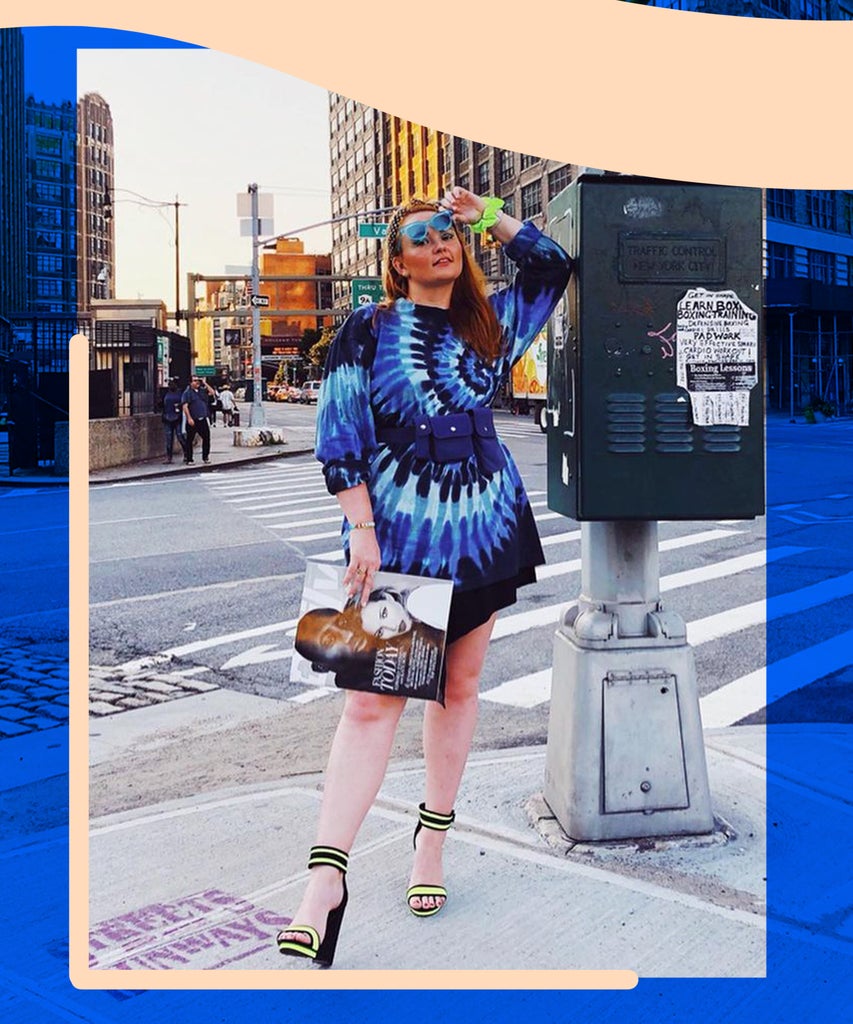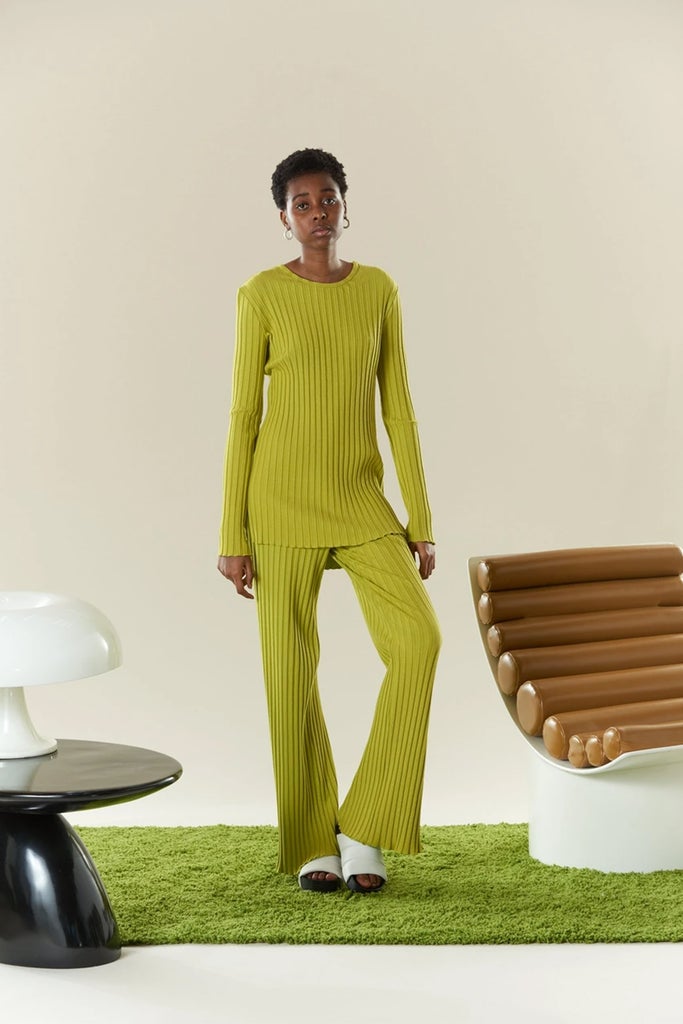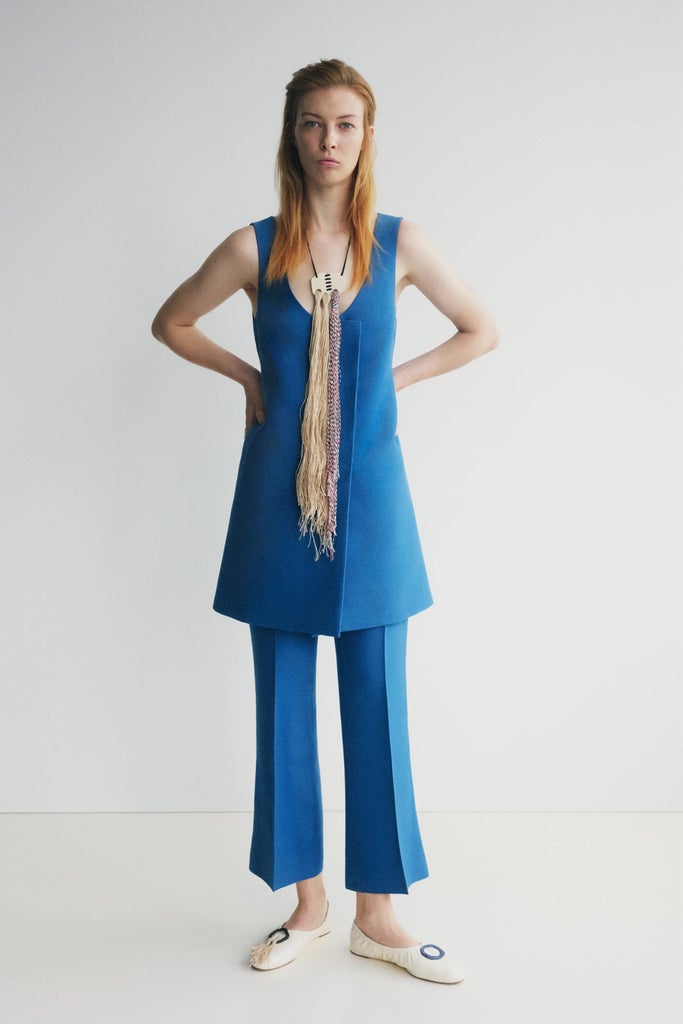
Editor’s note: The following article includes content regarding body dysmorphic disorder. Some details may be triggering. Please proceed thoughtfully.
I live in leggings. On any given day, there’s a 90% chance you’ll find me in Aerie’s OFFLINE Real Me High Waisted Legging — of which I have more pairs than any one human really needs — or, when I’m feeling spicy, Commando’s Faux Leather Animal Legging. As I’ve built my collection of comfortable leggings, I’ve also grown my arsenal of tunics — long enough to cover my crotch and most of my backside — to go with them. And thus begins my ode to the oft-overlooked shirt silhouette that’s helped me gain my confidence amidst a years-long journey with body dysmorphia.
The tunic image that’s currently in your mind is likely boxy, oversized, and rather genderless in its silhouette. This makes sense. Tunics first originated back in ancient Greek and Roman times and were worn by both men and women. While yesteryear’s tunics usually fit this frumpy, matronly profile, today’s styles — while still falling somewhere between the hips and the knees — are more fashion-forward. Depending on the designer, tunics can be fitted, flared, sleeveless, balloon-sleeved, and everything in between.
Their turn for the stylish aside, here’s why they have become a go-to for me. I have a complicated relationship with my body. From puberty through my mid-20s, I fit into a size 0 at my smallest and a 6 at my biggest. But then, right after my 25th birthday, I sought professional help for my mounting anxiety. Two prescriptions and four months later, I had gained 40 pounds — all without drastically changing my diet or exercise routine.
By that time, the key factor that led to exacerbating my anxiety — a toxic relationship — was out of the picture. So, with the approval of my doctor, I cancelled my prescriptions. While I’m glad to say that my mental health has been steady and manageable since making that decision, I’m less stoked to admit that the body dysmorphia I’ve dealt with since age 12 — long before ever having gained weight and my most recent weight gain — remain. And, despite now being in this body for three years, it still doesn’t always register as mine. On those days, tunics give me the comfort and confidence boost I need.


While it may seem that I have resorted to loose-fitting tops to hide my weight gain, the reality is different. Tunics have been my top of choice for the past seven or eight years, encapsulating my body at its smallest and largest sizes; shrouding my stomach and thigh gap (or current lack thereof) — and every dysmorphic thought as a result — in acceptance. Because that’s the thing: At both stages of my body journey, I’ve felt largely at odds, never feeling physically good enough — not when I had a six-pack and thighs that didn’t touch, and not once I had developed stretch marks on my hips and stomach, and discovered what friction does to my favorite pants. During both periods, tunics have helped me tune out those thoughts and focus on how I feel in general as opposed to as a result of obsessing over how my body looks. When I wear tunics, I not only feel comfortable in my body throughout all its evolving stages, but I exude confidence.
Of course, no article of clothing will teach me to learn to love and accept my body every step of the way. Not when my mind is trying to make me believe that it’s something it’s not; something worse and less worthy. It’s an ongoing process for me, but, while I am slowly but surely getting there, being able to express my sense of style while continuously cloaking my body in love and comfort — rather than constricting it — and shielding it from gazes (my own included) undoubtedly helps.
Tunics are also incredibly versatile. Some days call for a fully oversized tunic blouse (I love ELOQUII’s Elements Poet Sleeve Tunic and Zara’s Satin Effect Long Tunic Blouse), while others call for a tiny bit more tailoring to accentuate my curves while maintaining that coveted length (like Free People’s Olivia Printed Tunic and Anthropologie’s Quinn Sequined Tunic Blouse). The latter two brands have helped redefine the silhouette for me: Where Free People reigns supreme when it comes to gorgeous boho tunics, Anthropologie elevates the silhouette for a slightly more mature, business-casual style.
High-fashion is taking notice of the style, too. In fact, tunics took over the Spring/Summer 2021 fashion week runways. From a sleeveless ribbed number at Simon Miller and a scallop-hemmed stunner at Jason Wu to a retro wool style at Marina Moscone, an asymmetric turtleneck at Michael Kors, and a hanky hem at JW Anderson, it’s safe to say that tunics are more stylish than ever.
Tunics aren’t only for spring and summer, though. I consider them to be one of the most transitional garments that exists. Considering they fall somewhere between the hips and the knees, many tunics are long enough to be mini dresses and can be worn on their own. Once the temperatures take a dip for the chillier, pairing them over leggings, tights, and pants works equally as well.
While some find that opting for oversized silhouettes and styling leggings as pants is fashion illiterate at best and downright lazy at worst, for me, it all comes down to comfort, a general lack of regard for what other people think about how I choose to dress, and a deep appreciation for the ever-growing love of my body that doing so has granted me. Plus, have you seen how cute tunics can look with leggings and knee-high boots? I’m a forever fan.
If you are struggling with an eating disorder and are in need of support, please call the National Eating Disorders Association Helpline at 1-800-931-2237. For a 24-hour crisis line, text “NEDA” to 741741.
At Refinery29, we’re here to help you navigate this overwhelming world of stuff. All of our market picks are independently selected and curated by the editorial team. If you buy something we link to on our site, Refinery29 may earn commission.
Like what you see? How about some more R29 goodness, right here?
Is This The Golden Age Of Clogs?

No comments:
Post a Comment